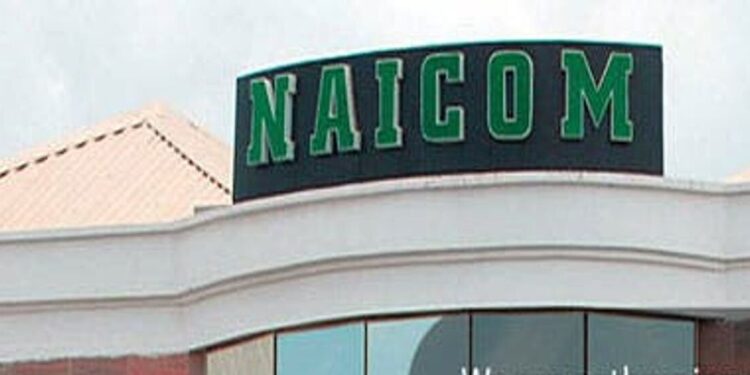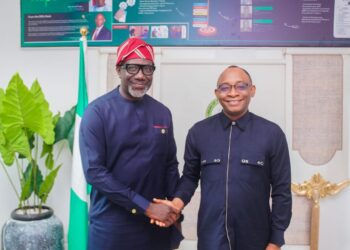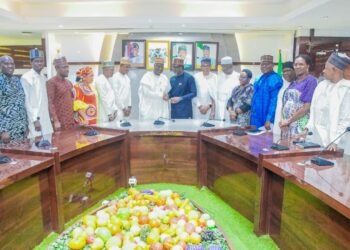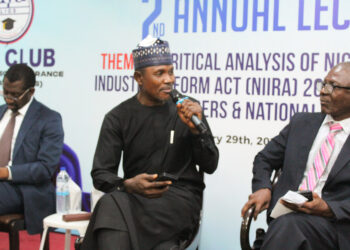The beehive of activities at the National Insurance Commission, is connecting with different segments of operations in the insurance operators and the consumers of insurance products offered by insurance companies, at the same time at a level not attained in the past.
Less than a week ago, the Commission at rare event in Abuja presented seven licences to board of directors of the companies; five of them are in the conventional insurance sector including a reinsurer. The other two are Takaful Islamic insurance companies, which offer service to the informal sector who up until now were excluded from conventional insurance for several reasons. Now the informal sector the home for individuals, artisans, traders small and big and small scale businesses once ignored is attracting attention and NAICOM is plotting the road map for access.
Pegging the direction the Commission is heading: developing the watershed that will feed the informal sector with the scent of water that will give vibrancy to inclusive insurance operations, NAICOM has engaged Star Sapphire Foundation, a non-government organisation to educate micro, small and medium enterprises (MSMEs) on the need for micro insurance and Takaful.
The Commission is taken cognisance of the largeness of the sector and it will require a large pool of resources and time to harness in a sustained manner for as long as it will require to register a satisfied work done.
The take off point for Star Sapphire Foundation was Kano, where a workshop was held for that purpose. Abuja date was December 1-2, the second in the series of workshops to raise the bar of insurance education for that segment of the economy. At the Abuja two-day workshop that ends today, Commissioner of Insurance, Mr. O S Thomas was represented by the assistant director, financial inclusion, Mr. Ahmed Kollere,
Kollere said NAICOM directional sign to reach the informal sector is pointing to the five areas of attention. “The most important area is the coverage for micro, small and medium enterprises (MSMEs).”
Stating the Commission clear view on this, he said the “workshop is to support the growth and development of MSMEs in Nigeria. This initiative is to support MSMEs to remain resilient during turbulent times as we have witnessed with Covid-19, #EndSARS protests and the recession.”
A major contributor to the financial inclusion strategy, the corporate communication and market development department, in the Commission, directed by Rasaq Salami, spreads the purpose further: “Our intention is to take this round the country because awareness is key. Majority of Nigerians do not know about insurance, and those who know about insurance don’t actually know the benefits inherent in the consumption. Our goal is to ensure that people are educated, they know what to do and the benefits, they know their rights when it comes to claims settlement, and also, when they have issues with the companies, they know where to go to seek redress.”
Not wanting the informal sector to miss the importance of insurance cover, Salami speaks: “My advice to companies, especially the MSMEs is to ensure that they take appropriate and adequate insurance to cover their businesses and to cover themselves as individuals, so that in the event of a loss, the insurance will bring them back to that same level they were before the loss.
“As much as possible, we will support foundations and agencies that are willing to join us in this campaign to ensure that Nigerians are properly educated on insurance,” he stated.
The voice of the chairman of Star Sapphire Foundation, Mr. Shehu Mohammed, collaborates the views of Salami on the purpose of the engagement: “As humans, we always need insurance. We want to share with everybody- micro, small and medium businesses the need to take to take up insurance coverage.”
The Commission advance to the conurbation of the informal sector is two-pronged. First is to saturate the sector with awareness and the straight jacket need for insurance cover for individuals and businesses at the sections consisting of microinsurance and Takaful. By this approach through the insurance companies the informal sector which is classified as excluded, will as it is beginning to indicate form the growing number of emerging inclusive data.
The second is the opening of microinsurance window for conventional insurance companies to start offering microinsurance products and services without having to establish a separate company to do that save to follow the requirements established by the Commission. The National Insurance Commission stated that the purpose of the new policy is part of the ongoing pursuit to support financial inclusion and increase insurance penetration in Nigeria. To balance the equation, NAICOM last week Friday (November, 27) presented two Takaful licences to the boards of the companies, in pursuant of the financial inclusion policy as it relates to insurance.
This month is a landmark date with the process of recapitalisation in the insurance industry for life, general, composite and reinsurance companies. By December 31, 2020 all compliant companies should have paid 50% of the required minimum capital depending on the class of business the company is involved in. However, several companies have reached that threshold. Talks of mergers and acquisitions are revolving in the market.
These combination of activities in the market put the regulator in the midst of a spinning gear from where all the policies diverge and also, converge as compliances streaming from the operators. It’s expected that before the year ends, the Commission will make good its pledge to publish guidelines for riot, strike and civil commotion endorsements for standard fire policy and comprehensive motor insurance, and any policy that has similar issue which up and until now were mostly endorsed free by insurers as a result of competition. The operators retreated from further free endorsements as a result of liabilities that would follow covered risks during #EndSARS protests.





































